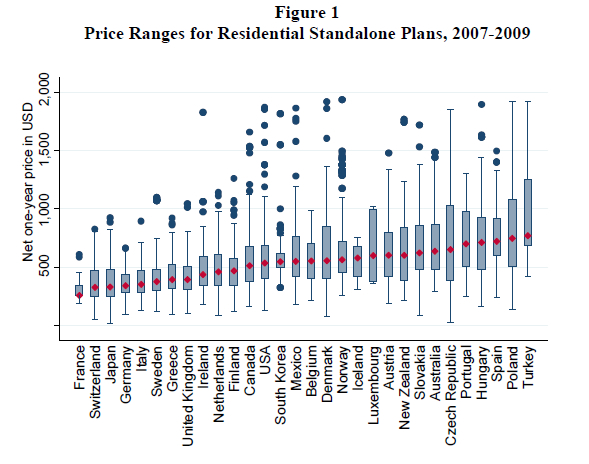A new study suggests that the United States could do better when it comes to home ISP prices. The Technology Policy Institute's latest survey of the global high speed Internet market finds that US residential broadband subscription rates have "remained fairly stable" over the last three years, rising by just two percent.
That's good, of course, since they didn't go way up. But residential broadband prices have fallen in most other countries, the paper notes—in some instances by as much as 40 percent.
The survey also found that prices in the United States for "triple play" plans are some of the most expensive among Organization for Economic Cooperation and Development (OECD) member nations.
Why the price gap? The paper emphasizes that "it does not evaluate the policies and other influences that impact those prices," but does note that many other nations require their big ISPs to "unbundle" or open their networks to small broadband providers at wholesale rates.
"Few countries actively regulate retail broadband prices, but every country that mandates network unbundling necessarily regulates wholesale prices," the TPI survey observes. "Wholesale prices are part of an ISP's costs, meaning that wholesale price regulation can affect retail prices. Thus it may not be surprising that the biggest price decreases have occurred in the EU [European Union], where wholesale prices for full unbundled loop access fell by about 10 percent between 2007 and 2009."
Looks like we're right back in the line sharing debate again. Late last year a Federal Communications Commission study concluded that unbundling works—consumers around the world enjoy better service because of it. Scientific American agrees, while the author of the FCC's National Broadband Plan is a skeptic. These new observations on pricing come from a think tank supported by AT&T and Verizon, and both of them oppose extending the concept here in the US.
Leaders and laggards
The TPI paper taps into a dataset of around 25,000 wireline broadband services offered in OECD member countries and tracks prices and price changes from 2007 through 2009. Some of the US data is positive. For example, the survey finds that business broadband prices here have dropped by 15 to 25 percent over that time period, with the biggest price decreases associated with faster speeds.



 Loading comments...
Loading comments...
